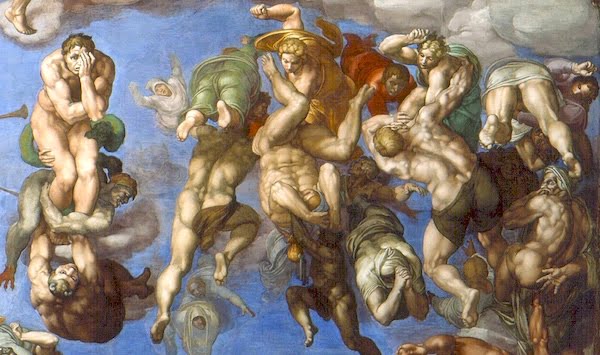Chapter Talk – Fourth Sunday of Lent – March 14, 2021, cycle-B
What is our image of God in terms of divine judgment? If we examine this question in the Hebrew Bible, we get multiple views and images. From a God who exacts retribution on its people who go against God’s law and ways. Then, to a God who relents from the punishment that God initially decides to do after seeing the people turning from their evil ways and repenting in a sincere, humble way. A repentant people moves the heart of God, causing God to change, to relinquish the destruction God had planned. Once Jesus comes on the scene, we see a further shift in the image of God, one that is fully embodied by Jesus.
“Whoever does not believe is condemned already” (Jn 3:18). In commenting on this phrase from St. John, Fr. Urs von Balthasar says that “The Gospel gives us a chance to revise our understanding of divine judgment during this time of Lent” (Light of the Word, p.177-178). What does this mean for us? This ‘revision’ or change certainly affects how we see God and added to this is how we see ourselves and one another. Von Balthasar expresses this change or shift in these words: “The decisive point is that whoever scorns God’s love condemns himself….God is nothing but love, love that goes as far as the Father sacrificing his Son out of love for the world” (p.178). How do we scorn or refuse God’s love? Have we ever even thought that we do this? Love, which is God, reaches out in mercy and forgiveness when we do or say something wrong and not true. This love comes with the light of truth, and if received, softens our hearts and helps us to see and to acknowledge our wrongdoing. Refusing the Divine touch of mercy puts one in a posture of rigidity and self-righteousness. Then, we easily point the finger at our neighbor and even puff ourselves up where we feel that we are better than our neighbor.
The story of the woman caught in adultery from St. John’s gospel encapsulates the extent of God’s mercy: “Whoever has not sinned throw the first stone”, says Jesus. And in the same story: as each accuser leaves the scene, Jesus says: “Woman, where are they? Has anyone condemned you?” She replies: “No one sir”. And Jesus answers: “Neither do I. Go, and sin no more”. There is no condemnation, only mercy and forgiveness. God in Jesus has another way of holding up a mirror before us, a mirror which shows where we need change. And yet, at the same encounter, we are encircled by unconditional mercy, which is the opposite of the voice that says: ‘See what you did’…Is not our refusal of God’s love a refusal to change? Perhaps we can only receive God’s mercy and love IF we have eagerness to change, to change an attitude, a behavior, the way I see another person.
God’s unconditional love is ultimately expressed in the gift of his Son. As we strive to live in Christ, we learn about this love that has no limits. It is a love that does not condemn or put another person down. When we do not receive God’s love in Christ, we have no basis for loving as Jesus’ love. We need God’s love. In fact, we love with the love that is God. Without God’s love and mercy at the center of our lives, the condemning voice has free reign within our inner lives! This condemning voice, then, puts our self-righteous self at the center not the merciful God. Thus, our refusal to receive God’s love in the end is what condemns us, it puts us at odds within ourselves and with one another.
Von Balthasar adds: “The whole question is whether we accept God’s love so that it can prove effective and fruitful in us, or whether we cower in our darkness in order to evade the light of this love. In the latter instance, ‘we hate the light’, we hate true love, and we affirm our egoism in any form whatsoever…When that happens, we are ‘already condemned’, but by ourselves, not by God” (p.178). Why is it so difficult to accept the truth of ourselves in any given moment? In many ways we say that we are open to change and conversion. However, it often is on our own terms….True conversion comes when there is a real turning, which involves a suffering that opens us to receive Divine mercy. This dying to our ‘egoism’ creates space for God’s love to act and for us to receive it. To accept the light of Divine love reveals how we have been untruthful, hard of heart, overly critical. This light of God’s love becomes our strength, our source of change, our guide. It informs the horizon out of which we think and act, as it did for Jesus. The intervention of God’s love is a paschal moment because for us to receive it, something must die to allow us to accept it, accept it in a way that changes us from within.
Sr. Kathy DeVico, Abbess


